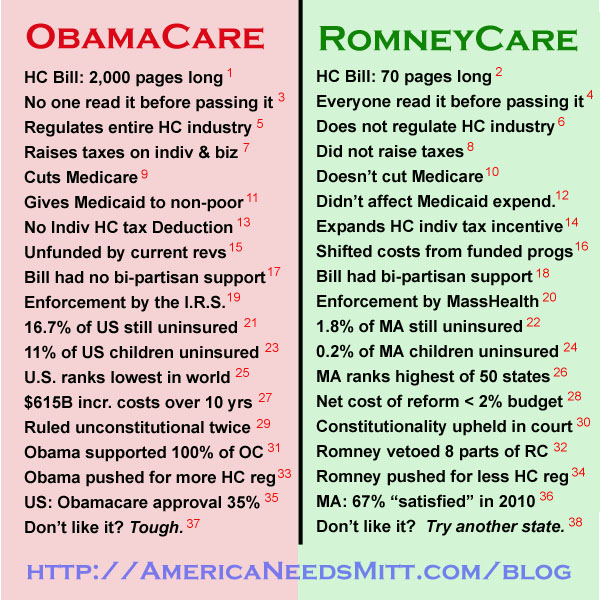If I knew the answer to the healthcare issues I would certainly provide it, but I know for a fact putting our gov't in charge of it is not the answer.
Well, the way it is going now is also not the answer. I may not like everything about Obamacare - but it is a start. If Romney is elected, he will also make a start - as he should, IMO. One thing I do know - is that if Romney is elected and he gets his interpretation of Romneycare going - the rampant hypocrisy we will see from some pundits and talking heads will make all of our heads spin...
- suddenly healthcare will be the best thing ever!
Sonya - it may be that if healthcare did go through and get finalized , the monthly fees may not wind up being what research through certain sources would tell you.
The reason healthcare is so costly is because some folks chose things like fancy cars, houses, even horses over paying their medical bills or buying insurance.
If only it was that simplistic - but unfortunately that is not what determines the cost of healthcare... it is far more complicated than that.
Here is an interesting quiz - which is which...
Obamacare or Romneycare? A live link in here screwed everything up and brought up all the coding - so I had to pull the live links for now...
1. Individuals who are deemed able to afford health insurance but fail to comply are subject to penalties for each month of non-compliance in the tax year. The penalties, which will be imposed through the individual's personal income tax return, shall not exceed 50% of the minimum monthly insurance premium.
2. Employers who employ 11 or more full-time equivalent employees and do not make a fair and reasonable contribution to their employees health insurance are required to pay a fine.
3. Tax credits to make it easier for the middle class to afford insurance will become available for people with income between 100 percent and 400 percent of the poverty line who are not eligible for other affordable coverage.
4. Children and adolescents up to age 18 whose financial eligibility as determined by the division exceeds 133 per cent but is not more than 300 per cent of the federal poverty level will be eligible for Medicaid.
5. Americans who earn less than 133 percent of the poverty level (approximately $14,000 for an individual and $29,000 for a family of four) will be eligible to enroll in Medicaid.
6. A recent poll asked people whether they had a generally favorable or unfavorable view of the health plan. Responses split 41 percent and 41 percent between favoring and not favoring. Another 18 percent said they were undecided.
7. Small businesses qualify for tax credits if they pay for at least half of the workers health insurance. A small business is defined as having fewer than 25 full-time workers paid average annual wages below $50,000.
8. Experience shows the plan is not significantly going to lower costs. Supporters of the law are actively considering new legislation aimed at cost containment.
9. The plan creates a Patient-Centered Outcomes Research Institute to conduct research to provide information about the best available evidence to help patients and their health care providers make more informed decisions.
10. For individuals who make more than $200,000 or couples that make more than $250,000, the plan increases Medicare taxes on wages in 2013 by 0.9 percent and imposes a 3.8 percent tax on investment income.
****************
1. RomneyCare
Source: Massachusetts Department of Revenue, TIR 09-25: Individual Mandate Penalties for Tax Year 2010
Note: Both plans have individual mandates. The federal penalties start small, but eventually ramp up to $695 per year or 2.5 percent of income, whichever is higher. Eventually, federal penalties will tend to be higher than the Massachusetts plan.
2. RomneyCare
Source: Massachusetts Department of Revenue, Health Care Information for Employers
Note: Federal law exempts employers with fewer than 50 workers. Additionally, under the federal plan, employers pay fines only if their workers qualify for tax credits to buy insurance.
3. ObamaCare
Source: HealthCare.gov, Provisions of the Affordable Care Act, By Year
Note: The Massachusetts law also provides subsidized health insurance, but the income cut-off is 300 percent of the federal poverty level.
4. RomneyCare
Source: Massachusetts health care law
Note: The Massachusetts law expanded Medicaid for children. The federal law expands Medicaid to adults, but sets the cut-off at 133 percent of the federal poverty level.
5. ObamaCare
Source: HealthCare.gov, Provisions of the Affordable Care Act, By Year
Note: The Massachusetts law expanded Medicaid for children. The federal law expands Medicaid to adults, but sets the cut-off at 133 percent of the federal poverty level.
6. ObamaCare
Source: The Kaiser Family Foundation, Kaiser Health Tracking Poll, April 2011
Note: Polls show the federal law has split public opinion.
7. ObamaCare
Source: Internal Revenue Service, Small Business Health Care Tax Credit for Small Employers
Note: Tax credits start at 35 percent of the employer's health premium costs and increase to 50 percent in 2014.
8. RomneyCare
Source: Gov. Deval Patrick, Patrick-Murphy administration proposes comprehensive health care cost containment legislation, Feb. 17, 2011, AP, Lawmakers hear bill to rein in Mass. health costs, May 16, 2011
9. ObamaCare
Source: U.S. Government Accountability Office, Patient-Centered Outcomes Research Institute (PCORI) Governing Board, Patient-Centered Outcomes Research Institute (PCORI)
10. ObamaCare
Source: Kaiser Family Foundation, "summary of new health reform law"













































